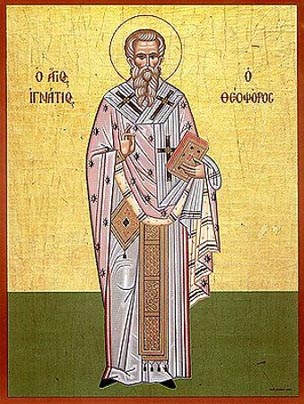
The PriestMartyr Ignatios the God-Bearer
Commemorated on December 20
The PriestMartyr
Ignatios the God-Bearer, a native of Syria, was a disciple of the holy
Apostle and Evangelist John the Theologian, as was also Sainted Polycarp,
Bishop of Smyrna (Comm. 23 February). Saint Ignatios was the second bishop of
Antioch, and successor to Bishop Evodus, Disciple from amongst the Seventy.
Tradition suggests,
that when Saint Ignatios was a little boy, the Saviour hugged him and said:
"If ye wilt not turn and be as little children, ye shalt not enter into
the Kingdom of Heaven" (Mt. 18: 3). The saint was termed
"God-Bearer" since he had the Name of the Saviour in his heart and
prayed unceasingly to Him. Saint Ignatios was zealous and spared no efforts for
toiling in the fields of Christ. To him is attributed the establishing within
church services of antiphonal singing (for two parts or choirs). During time of
persecution he was a source of strength to the souls of his flock, and was
himself ardent in the wish to suffer for Christ.
In the year 106 the
emperor Trajan (98-117), on the occasion of a victory over the Skyths, gave
orders to everywhere offer sacrifice to the pagan gods, and put to death any
Christians refusing to worship idols. And in the year 107, during the time of a
campaign against the Armenians and Parthians, the emperor Trajan happened to
pass through Antioch. Here they made denunciation to him that Bishop Ignatios
openly confessed Christ, and with this taught to contemn riches, to lead a
virtuous life and preserve virginity. At this moment Saint Ignatios himself
came voluntarily before the emperor, so as to avert persecution against the
Christians in Antioch. The persistent requests of the emperor Trajan were
resolutely rejected by Saint Ignatios. The emperor then decided to have him
taken away for devouring by wild beasts at Rome. Saint Ignatios joyfully
accepted the sentence imposed upon him. His readiness for the deed of martyrdom
was attested to by eye-witnesses, accompanying Saint Ignatios from Antioch to
Rome.

On the way to Rome,
the ship having set out from Seleucia stopped over at Smyrna, where Saint
Ignatios met with his friend the Smyrna Bishop Polycarp. Clergy and believers
from other cities and towns thronged to Saint Ignatios. Saint Ignatios exhorted
everyone not to fear death and not grieve over him. In his Epistle of 24 August
107 to the Roman Christians, he asked them to assist him with their prayers, so
as to beseech God to strengthen him in his impending act of martyrdom for
Christ: "I seek Him Who hath died for us, I desire Him Who hath risen for
us... My love wast crucified, and within me is no fire loving material things,
but rather the living water that speaketh within me, from within calling unto
me: 'I go unto the Father'".
From Smyrna Saint
Ignatios went to the Troiad. Here he met with the happy news about the
cessation of persecution against Christians in Antioch. From the Troiad Saint
Ignatios sailed to Neapolis (in Macedonia) and then to Philippi.
Along the way to Rome
Saint Ignatios visited churches, and gave discourses of teaching and guidance.
He also then wrote six epistles: to the Ephesians, to the Magnezians, to the
Trallians, to the Philadelphians, and to the Smyrna Bishop Polycarp. All these
epistulary letters were preserved and have survived to our present day.
The Roman Christians
met Saint Ignatios with great joy and profound sorrow. Certain of them had
hopes to persuade the people to give up on making it a bloody spectacle, but
Saint Ignatios implored them not to do this. Bending down upon his knees, he
prayed together with all the believers for the Church, for love between the
brethren and for an end to the persecution against Christians. On the day of a
pagan feast, 20 December, they led Saint Ignatios into the circus arena, and he
turned to the people: "Men of Rome, ye do know, that I am sentenced to
death not because of any wrong-doing, but in love of my One God, by love for
Whom I am embraced and unto Whom I do aspire. I am His wheat and by the teeth
of wild beasts I shall be grinded, so as for Him to be a pure bread".
Right after this the lions were released. Tradition relates that in going to
execution, Saint Ignatios unceasingly repeated the Name of Jesus Christ. When
they asked him why he was doing this, Saint Ignatios answered, that he carried
this Name in his heart, "He that is imprinted in mine heart, is He Whom I
confess with my lips". When the saint was torn to pieces, it turned out
that his heart was not touched. Having cut open the heart, the pagans beheld
within it in gold lettering : "Jesus Christ". On the night after his
execution Saint Ignatios appeared to many of the faithful in their sleep to
comfort them, and certain of them saw him at prayer.
Hearing about the
great courage of the saint, Trajan thought well of him and stopped the
persecution against the Christians. The relics of Saint Ignatios were
transferred to Antioch (the account about this is located under 29 January),
and again at a later time on 1 February were returned with glory and put in the
church named for the PriestMartyr Clement, Pope of Rome (91-100).
© 1996-2001 by translator Fr. S. Janos.